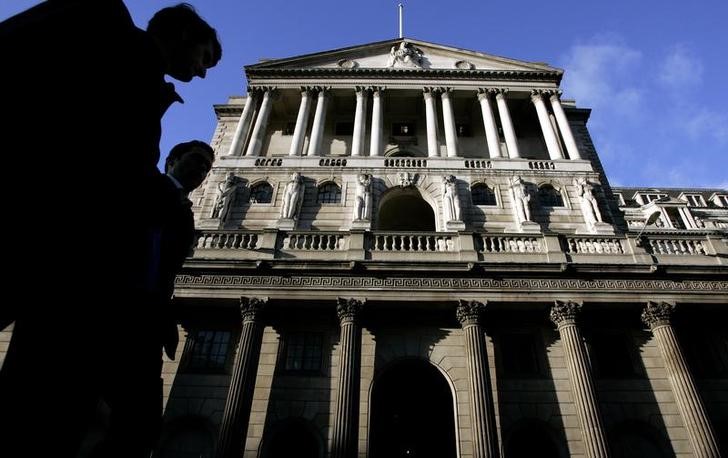By William Schomberg
LONDON (Reuters) - The Bank of England will probably try on Thursday to avoid adding to speculation about a first interest rate hike in nearly a decade, even as it acknowledges the resilience of Britain's economy since last year's Brexit vote shock.
After Britain surprisingly outgrew the world's other big rich economies last year, the BoE is expected to raise its 2017 growth forecast for the second time in three months, according to a Reuters poll of economists.
A fresh growth upgrade might encourage some investors to bet on a first rate hike since 2007 as well as invite further criticism of warnings before June's referendum by Governor Mark Carney and his fellow rate-setters that a vote to leave the bloc would deliver a quick hit to the economy.
Inflation is already set to overshoot the Bank's 2 percent target in the coming months.
But the BoE is likely to raise its inflation forecasts only marginally on Thursday in a quarterly report on the economy.
Furthermore, Carney and his colleagues have no clear idea of the implications of Prime Minister Theresa May's plan to take Britain out of the EU's single market when it leaves the bloc, nor of the protectionist trade policies of new U.S. President Donald Trump which could put strains on the world economy.
"I would be very surprised if they are agonising about whether they could keep policy stimulatory or ought to be moving quickly to remove it," Charlie Bean, a former BoE deputy governor, said.
He said he expected a "significant slowing of consumer spending over the next year or two" as a strong increase in inflation eats into the spending power of many households.
While financial markets are pricing in a roughly 50-50 chance of a rate hike by the BoE this year, most economists say it probably will not happen until mid-2019, once Britain has wrapped up its Brexit negotiations and left the EU.
The Bank is likely to say on Thursday that it now expects economic growth of about 1.7 or 1.8 percent this year, according to various private economists.
While that would be more than double the forecast the Bank made in August, a few weeks after the referendum, and higher than its November forecast of 1.4 percent, it would still represent a slight slowdown from last year.
The BoE is expected to stick to its announcement in November that it was taking a neutral stance on whether its next policy move would be a rate hike or a cut.
The Bank is also expected to say on Thursday that its nine policymakers voted to keep interest rates at their record low of 0.25 percent and to let their 60 billion pound expansion of the BoE's government bond purchases end this month as scheduled.
But some Monetary Policy Committee members might choose to send a signal of their growing confidence in the outlook.

Kallum Pickering, an economist with Berenberg, said some of them might vote for an early end to the Bank's smaller corporate bond-buying programme, which was launched in August.